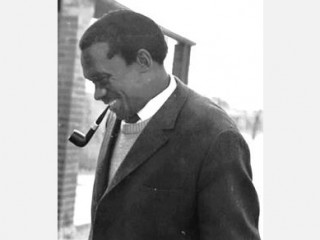
Anton Lembede biography
Date of birth : 1913-03-21
Date of death : -
Birthplace : Eston, Natal
Nationality : South African
Category : Famous Figures
Last modified : 2010-12-17
Credited as : Political activist, ,
Anton Lembede (1913-1947) helped revitalize and provided much of the philosophical foundation for black resistance to white supremacy in South Africa in the mid-20th century.
Anton Muziwakhe Lembede grew up in a South Africa in which the black population was being stripped systematically of its land and basic rights. In the year of his birth (1913) the white government deprived blacks of access to most of the country's land, though they comprised 80 percent of the population. As South Africa became increasingly industrialized, rural whites and blacks, pushed off the land by poverty, migrated to the cities to fill the growing demand for labor. To protect whites from job competition, the government's "Civilized Labour" policy of 1924 barred blacks from many trades. In the 1930s blacks' few voting rights were curtailed, as was their right to settle permanently in cities. The climax of discrimination occurred in 1948, when the newly elected Nationalist Party launched apartheid, whose purpose was to segregate the races thoroughly, except where whites needed blacks as menial laborers.
Lembede's parents were Zulu sharecroppers on a white farm. They were devout Roman Catholics and, though impoverished, struggled to educate their children. Lembede apparently had a powerful urge for knowledge, and in 1933 he won a scholarship to Adams Teacher Training College. Here he joined the African elite by earning a degree with distinction in Latin in 1937. While holding several teaching jobs during the next several years, he studied philosophy and law by correspondence with the University of South Africa, earning a Master's degree in philosophy.
In 1943 Lembede began work in the Johannesburg law office of Pixley Seme, a founder of the African National Congress (ANC) in 1912. The ANC had steadily protested treatment of blacks; its methods, reflecting the largely middle class membership, involved cooperation with liberal whites and work within the established system. By the 1930s this activity had accomplished little, and younger members like Lembede began to view the ANC as stale, its methods futile and outmoded. Lembede and several other members, including Peter Mda and Nelson Mandela, formed the Youth League in 1944 as a subsidiary of the ANC to rethink the ANC's philosophy and methods. Lembede became the league's first president.
The Youth League sought to adapt the ANC's activity to new South African conditions. Urbanization had brought masses of blacks together, far from their traditional home-lands. Life in the segregated slums of Johannesburg, Durban, and Port Elizabeth created new problems and frustrations. Urban blacks, the league felt, needed more militant leadership. Marxism, speaking directly to the growing working classes, had gained among black intellectuals. In addition, the Youth League noted the failure of the ANC's traditional methods and increasing black poverty. Lembede, often working with Mda, became the leading theoretician of the departure from ANC orthodoxy.
The league argued that civil disobedience was necessary to redress African grievances. Lembede, however, insisted that direct action must be preceded by the development of a new philosophy and, more important, a new mentality among blacks. He thus developed the concept of "Africanism," which involved a vigorous African nationalism and the rejection of European standards as the basis for African behavior. There was, Lembede argued, an African "spirit," stemming from traditional African culture and history, which needed to be reborn. He stressed the accomplishments of African heroes of the past. To this spirit could be grafted elements of other cultures, such as Christian morality, appropriate to modern life, but the African spiritual foundation was crucial. Blacks, battered by generations of white paternalism and oppression, needed pride in their Africanness. Among other things, this meant no alliances with whites, even the most sympathetic. Otherwise, Africans would be deflected from fulfilling their own needs and remain dependent on whites. Lembede also asserted that South Africa was an African land, and blacks were the only legitimate "owners."
Many Marxists were among the most energetic opponents of racism, but Lembede rejected Marxism as being both insufficiently African and excessively materialistic. The fact that Lembede remained a practicing Roman Catholic probably contributed to this view, though he did espouse a vague socialism.
Once Africanism had become established, Africans could confront white power directly. Lembede did not, however, live to see the passage of the Youth League's 1949 Programme of Action, which called for various forms of civil disobedience. He died of an undisclosed illness in July of 1947.
Although he was politically active only four years, Lembede's influence on black politics in South Africa was profound. His ideas were basic to Youth League philosophy, which in time forced most of the more conservative ANC leaders into inactivity. In 1952 the ANC launched its Defiance Campaign, based on the Programme of Action, which included strikes and boycotts. When radical ANC members broke away in 1958 to form the Pan-Africanist Congress, they did so in part because of the failure of the ANC to adopt fully enough Lembede's Africanism. After the PAC-influenced demonstrations of 1960, which culminated at Sharpeville in the killing of 69 blacks, the ANC and the PAC were outlawed. But Lembede's ideas re-emerged in the Black Consciousness Movement, which rose to prominence in the 1970s under Steve Biko's leadership. Such new leaders were, according to Gail Gerhart, "the embodiment of the Africanist vision of Lembede: proud, self-reliant, determined."
There is no published biography of Lembede. Biographical sketches and considerations of his political activity appear in Mary Benson, The Struggle for a Birthright (1966); Peter Walshe, The Rise of African Nationalism in South Africa (1971); and particularly Gail M. Gerhart, Black Power in South Africa (1978). For an outline of South African history and society, see Leo Marquard, The People and Policies of South Africa (1969).
















